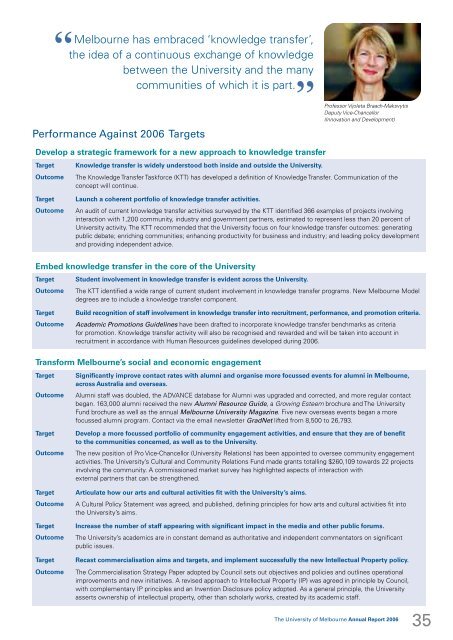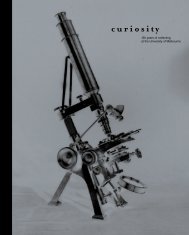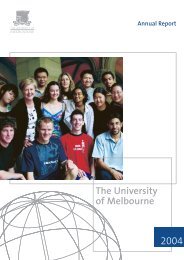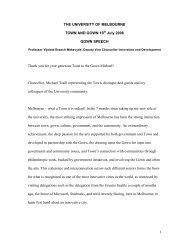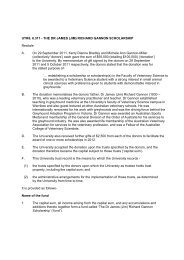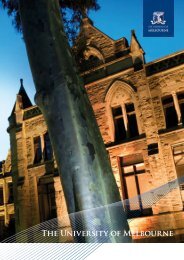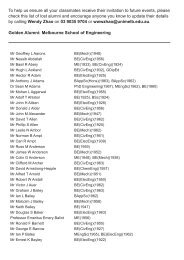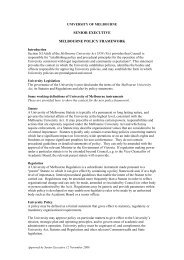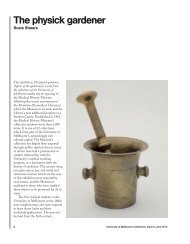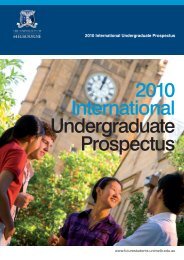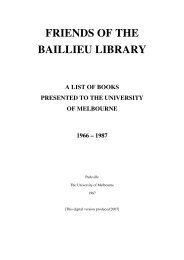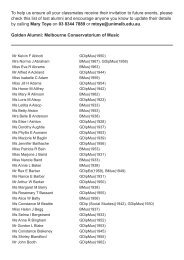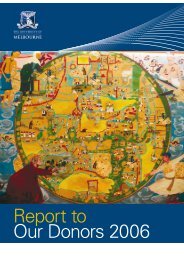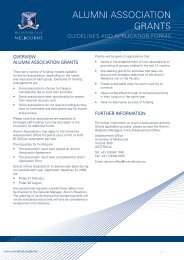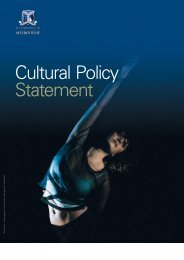annual report/2006 - University of Melbourne
annual report/2006 - University of Melbourne
annual report/2006 - University of Melbourne
Create successful ePaper yourself
Turn your PDF publications into a flip-book with our unique Google optimized e-Paper software.
<strong>Melbourne</strong> has embraced ‘knowledge transfer’,<br />
the idea <strong>of</strong> a continuous exchange <strong>of</strong> knowledge<br />
between the <strong>University</strong> and the many<br />
communities <strong>of</strong> which it is part.<br />
“<br />
”<br />
Performance Against <strong>2006</strong> Targets<br />
Pr<strong>of</strong>essor Vijoleta Braach-Maksvytis<br />
Deputy Vice-Chancellor<br />
(Innovation and Development)<br />
Develop a strategic framework for a new approach to knowledge transfer<br />
Target<br />
Outcome<br />
Knowledge transfer is widely understood both inside and outside the <strong>University</strong>.<br />
The Knowledge Transfer Taskforce (KTT) has developed a definition <strong>of</strong> Knowledge Transfer. Communication <strong>of</strong> the<br />
concept will continue.<br />
Target<br />
Outcome<br />
Launch a coherent portfolio <strong>of</strong> knowledge transfer activities.<br />
An audit <strong>of</strong> current knowledge transfer activities surveyed by the KTT identified 366 examples <strong>of</strong> projects involving<br />
interaction with 1,200 community, industry and government partners, estimated to represent less than 20 percent <strong>of</strong><br />
<strong>University</strong> activity. The KTT recommended that the <strong>University</strong> focus on four knowledge transfer outcomes: generating<br />
public debate; enriching communities; enhancing productivity for business and industry; and leading policy development<br />
and providing independent advice.<br />
Embed knowledge transfer in the core <strong>of</strong> the <strong>University</strong><br />
Target<br />
Outcome<br />
Student involvement in knowledge transfer is evident across the <strong>University</strong>.<br />
The KTT identified a wide range <strong>of</strong> current student involvement in knowledge transfer programs. New <strong>Melbourne</strong> Model<br />
degrees are to include a knowledge transfer component.<br />
Target<br />
Outcome<br />
Build recognition <strong>of</strong> staff involvement in knowledge transfer into recruitment, performance, and promotion criteria.<br />
Academic Promotions Guidelines have been drafted to incorporate knowledge transfer benchmarks as criteria<br />
for promotion. Knowledge transfer activity will also be recognised and rewarded and will be taken into account in<br />
recruitment in accordance with Human Resources guidelines developed during <strong>2006</strong>.<br />
Transform <strong>Melbourne</strong>’s social and economic engagement<br />
Target<br />
Outcome<br />
Significantly improve contact rates with alumni and organise more focussed events for alumni in <strong>Melbourne</strong>,<br />
across Australia and overseas.<br />
Alumni staff was doubled, the ADVANCE database for Alumni was upgraded and corrected, and more regular contact<br />
began. 163,000 alumni received the new Alumni Resource Guide, a Growing Esteem brochure and The <strong>University</strong><br />
Fund brochure as well as the <strong>annual</strong> <strong>Melbourne</strong> <strong>University</strong> Magazine. Five new overseas events began a more<br />
focussed alumni program. Contact via the email newsletter GradNet lifted from 8,500 to 26,793.<br />
Target<br />
Outcome<br />
Target<br />
Outcome<br />
Target<br />
Outcome<br />
Target<br />
Outcome<br />
Develop a more focussed portfolio <strong>of</strong> community engagement activities, and ensure that they are <strong>of</strong> benefit<br />
to the communities concerned, as well as to the <strong>University</strong>.<br />
The new position <strong>of</strong> Pro Vice-Chancellor (<strong>University</strong> Relations) has been appointed to oversee community engagement<br />
activities. The <strong>University</strong>’s Cultural and Community Relations Fund made grants totalling $260,109 towards 22 projects<br />
involving the community. A commissioned market survey has highlighted aspects <strong>of</strong> interaction with<br />
external partners that can be strengthened.<br />
Articulate how our arts and cultural activities fit with the <strong>University</strong>’s aims.<br />
A Cultural Policy Statement was agreed, and published, defining principles for how arts and cultural activities fit into<br />
the <strong>University</strong>’s aims.<br />
Increase the number <strong>of</strong> staff appearing with significant impact in the media and other public forums.<br />
The <strong>University</strong>’s academics are in constant demand as authoritative and independent commentators on significant<br />
public issues.<br />
Recast commercialisation aims and targets, and implement successfully the new Intellectual Property policy.<br />
The Commercialisation Strategy Paper adopted by Council sets out objectives and policies and outlines operational<br />
improvements and new initiatives. A revised approach to Intellectual Property (IP) was agreed in principle by Council,<br />
with complementary IP principles and an Invention Disclosure policy adopted. As a general principle, the <strong>University</strong><br />
asserts ownership <strong>of</strong> intellectual property, other than scholarly works, created by its academic staff.<br />
The <strong>University</strong> <strong>of</strong> <strong>Melbourne</strong> Annual Report <strong>2006</strong><br />
35


